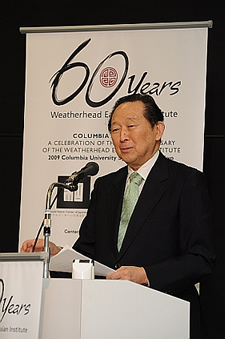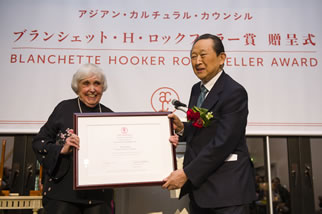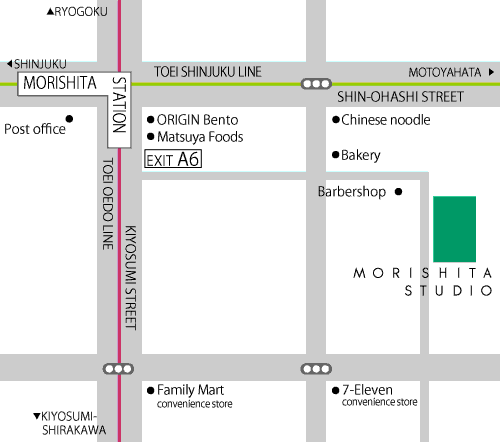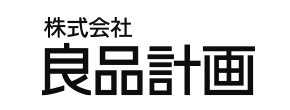The Saison Foundation
The Saison Foundation is a grant-making foundation that supports projects and activities related to contemporary Japanese theater and dance.
Foundation Outline
The Saison Foundation is a private grant-making foundation established by Seiji Tsutsumi. The foundation supports contemporary Japanese theater and dance through its programs that are based on the following principles:
(1) Long-term support to artists and to their creative activities
(2) Compound support system
(3) Support towards the improvement of the performing arts infrastructure
Profile
■OUTLINE
Mission
The Saison Foundation is dedicated to creating new values and to enhancement of mutual understanding among people by supporting activities related to arts and culture.
Date of Establishment
July 13, 1987
Founder
Seiji Tsutsumi
■PROGRAM OUTLINE
Grant Programs
The Saison Foundation, whose main areas of support are contemporary theater and dance, gives grants and/or provide spaces for rehearsals, etc., to artists and art companies through each of its programs.
Independently Organized & Co-organized Programs
It also sponsors/co-sponsors performances, seminars, and workshops, and issue newsletters.
About our founder Seiji Tsutsumi
About our founder Seiji Tsutsumi

Seiji Tsutsumi giving a speech on behalf of The Saison Foundation, which was awarded the Donald Keene Prize for the Promotion of Japanese Culture, in June 2009.
Photo: Kazushi Momoi
PREFACE
With the year 2000 rapidly approaching, we are gravely concerned about the current position of Japan in world affairs and the role that our nation is expected to play in the new century. Living in the latter part of the twentieth century, we can enjoy the economic prosperity resulting from forty years of hard endeavor since the end of World War II, but in the process of reaching this level we have sacrificed much and we have either lost sight of many of our old values, or their quality and shape have been changed owing to our negligence whilst involved in the race to move ahead. The changes that are occurring in the arts in these final years of the century are demonstrating that our own culture is fast losing its character and traditions. Whilst Japan is considered a major economic power, people tend to regard her as a country of relatively minor cultural significance. These considerations, together with our isolation from international society, suggest some uncertainty about our country’s future.
In order to replenish and reinvigorate the creative power rooted in the soil of Japan, it is essential to infuse our own culture with a host of fresh ideas and allow a free flow of artistic expression to develop abundantly. One significant means to this end is the promotion of international cultural exchange at a highly active level, refreshing our sensibilities and insight to the point where creativity can be restored within the context of contemporary society, and this, in return, should enable us to regain our international perspective.
The objectives of The Saison Foundation shall be (a) to carry out activities conductive to the stimulation of creativity amongst persons or bodies engaged in various fields of art and culture, and (b) to expedite international cultural exchange by the provision of grants such as to Japanese artists wishing to study in foreign countries and to foreign artists desirous of undertaking a period of study in Japan, or to projects inviting foreign artists and groups to show their work or present their performances in Japan. It is our sincere hope that through these activities we shall be able to contribute to the development of culture in our country.
Seiji Tsutsumi
Seiji Tsutsumi, aka Takashi Tsujii
Seiji Tsutsumi was born in Tokyo in March 1927. After graduating from the Faculty of Economics of the University of Tokyo, Tsutsumi started his career as a secretary to his father, Yasujiro Tsutsumi, who was at the time Chairman of the House of Representatives. Tsutsumi then joined Seibu Department Stores in 1954. He became president of the supermarket chain Seiyu, which he founded in 1963, and president of Seibu Department Stores in 1966. During the 1970s and the 1980s, Tsutsumi built and led the conglomerate known as the Saison Group, which included numerous companies such as Credit Saison, Ryohin Keikaku (which owns the brand MUJI), and the convenience store chain Family Mart. Tsutsumi resigned from his post as representative of the Saison Group in 1991.
In 1982, Tsutsumi donated two million U.S. dollars from the Saison Group to the Asian Cultural Council (ACC), a foundation which belongs to the Rockefeller legacy of philanthropic giving, to establish ACC’s office in Tokyo and eventually launch its Japan-United States Arts Program. At that time, this was the largest corporate contribution from Japan ever made to an arts program of a U.S. nonprofit organization. Tsutsumi became a member of ACC’s board of trustees from 1983 and was appointed as a life trustee in 2012. Tsutsumi established the Takanawa Art Museum (now known as the Sezon Museum of Modern Art) in 1986, and The Saison Foundation with his own personal funds in 1987, and served as presidents of the two foundations until his demise in November 2013. He also served as a member of the board of trustees of the Noguchi Museum, the Japan Advisory Committee of the Japan Society of New York, and the International Council of The Museum of Modern Art, New York.
Tsutsumi was awarded the Chevalier de l’Ordre de la Legion d’Honneur in 1970 and Officier de l’Ordre de la Legion d’Honneur in 1987 from the French Republic, the Commander’s Cross 1st Class for Service to the Republic of Austria in 1989, and was named as Honorable Doctor of Moscow State University in 1993. In 1998, Tsutsumi received a doctorate in economics from Chuo University for his 1996

Seiji Tsutsumi receives the Blanchette Hooker Rockefeller Award from Ms. Elizabeth McCormack, Chairman Emerita of the Asian Cultural Council (ACC), in Tokyo in October 2012.
Photo: Masaya Yoshimura
Tsutsumi was also active as a poet and novelist under the pen name Takashi Tsujii. After releasing his first anthology of poems titled Futashikana Asa (An Uncertain Morning) in 1955, he published many works and won prizes for his books of poetry and novels, including the Junichiro Tanizaki Prize in 1994, the Noma Literary Prize in 2004, the Japan Art Academy Prize in 2006, the Yomiuri Prize for Literature in 2007, and the Japan Poets Association’s Contemporary Poets Award in 2009. Tsujii was inducted into the Japan Art Academy in 2007. He was selected as meshiudo (the person who composes a poem by special order of His Majesty the Emperor of Japan) for the Imperial New Year’s Poetry Reading in 2012, and was also honored as Person of Cultural Merit by the Japanese government the same year. His works have been translated into English, French, German, Italian, Russian, Arabic, Korean, and Chinese. As Takashi Tsujii, he served as member of the board of directors of the Japan Pen Club, vice-president of the Japan Writers’ Association, and was chairman of the Japan-China Cultural Exchange Association.
Chronology of Seiji Tsutsumi/Takashi Tsujii
| 1927 | Born in Mitaka, Tokyo on March 30 |
| 1951 | Appointed as President of Kunitachi Gakuen School |
| 1954 | Enters Seibu Department Stores, Ltd. (SDS) |
| 1955 | Publishes his first anthology of poems titled Futashkana Asa (An Uncertain Morning) under the pen name Takashi Tsujii |
| 1961 | Organizes an art exhibition of Paul Klee’s works at SDS’s Ikebukuro store |
| 1962 | Takanawa Art Museum opens in Tokyo |
| 1971 | Tsutsumi is awarded the Chevalier de l’Ordre de la Legion d’Honneur from the French Republic |
| 1973 | Parco shopping center and Seibu Theater (later renamed as Parco Theater) opens in Shibuya, Tokyo |
| 1975 | The Seibu Museum of Art, Libro bookstore, and Art Vivant (a store that specializing in art books and records) opens at SDS’s Ikebukuro store |
| 1978 | Tsutsumi becomes a trustee of the International Council of The Museum of Modern Art of New York |
| 1979 | Ikebukuro Community College (culture school) and a multi-use space Studio 200 opens at SDS’s Ikebukuro store |
| 1981 | Takanawa Art Museum is transferred to Karuizawa in Nagano prefecture and becomes a museum of modern art Establishment of the convenience store chain Family Mart |
| 1983 | Seiyu opens the first Muji store in Aoyama, Tokyo (now operated by Ryohin Keikaku Co., Ltd.) Seibu Credit Co., Ltd. (now known as Credit Saison Co., Ltd.) launches its Saison Card full-scale Roppongi WAVE, a building housing a store selling records, CDs, and videos and a cinema called Cine Vivant, opens in Roppongi, Tokyo The Saison Group donates two million U.S. dollars to the Asian Cultural Council (ACC) of New York |
| 1984 | SDS’s Yurakucho Seibu, which houses Yurakucho Art Forum, opens in Tokyo Seibu Art Forum opens in SDS’s Ikebukuro store |
| 1985 | Seibu Retailing Group is renamed as the Seibu Saison Group |
| 1986 | Takanawa Art Museum (now known as Sezon Museum of Modern Art) is registered as a foundation SEED Hall opens in SDS’s Shibuya store in Tokyo |

At his home library
| 1987 | Seiji Tsutsumi establishes The Saison Foundation with his personal funds and becomes its president Tsutsumi is awarded the Officier de l’Ordre de la Legion d’Honneur from the French Republic |
| 1988 | Yatsugatake Music Hall opens in Nagano prefecture |
| 1989 | Sezon Art Museum opens in Ikebukuro Tsutsumi is awarded the Commander’s Cross 1st Class for Service to the Republic of Austria |
| 1990 | Seibu Saison Group is renamed as the Saison Group |
| 1991 | Tsutsumi announces his retirement as Representative of the Saison Group Takanawa Art Museum is renamed as Sezon Museum of Modern Art |
| 1993 | Tsutsumi becomes Honorable Doctor of Moscow State University |
| 1994 | The Saison Foundation opens Morishita Studio, a building with rehearsal facilities for theater and dance, in Tokyo |
| 1998 | Tsutsumi receives a doctorate in economics from Chuo University for his 1996 thesis Blueprint for Change – Beyond the Distribution Theory |
| 2003 | The Saison Foundation receives the 2003 Mecenat Award for Leading the Theatrical Arts from the Association for Corporate Support of the Arts |
| 2007 | Takashi Tsujii is inducted into the Japan Art Academy |
| 2009 | The Saison Foundation receives the Donald Keene Prize for the Promotion of Japanese Culture |
| 2012 | Serves as meshiudo, the person who composes a poem by special order of His Majesty the Emperor of Japan, at the Imperial New Year’s Poetry Reading Tsutsumi receives the Blanchette Hooker Rockefeller Award from the Asian Cultural Council (ACC) Tsujii is selected as Person of Cultural Merit by the Japanese government |
| 2013 | Dies in Tokyo on November 25 |
Board of Trustees and Directors
TRUSTEES |
|
| Tatsuro Ishii | Dance critic |
| Masaaki Kanai | Adviser, Ryohin Keikaku Co., Ltd. |
| Kazuko Koike | Professor Emeritus, Musashino Art University; founder of Sagacho Archives |
| Kazuko Matsuoka | Theater critic and translator |
| Kiyoshi Mizoochi | Theater critic |
| Katsumi Mizuno | Representative,Executive President and COO, Credit Saison Co., Ltd. |
| Minako Naito | General Producer of Performing Arts, Tokyo Metropolitan Theatre, Tokyo Metropolitan Foundation for History and Culture |
| Mitsuyoshi Numano | Professor Emeritus, University of Tokyo |
| Mariko Ozaki | Literary critic |
| Shunichi Sato | Adviser,Daikin Industries,Ltd.;Adviser,Clover Network Com Co.,Ltd.;Managing Drector,Hashida Cultural Foundation |
| Takao Tsutsumi | President, Director, Sezon Museum of Modern Art |
| Tadashi Uchino | Professor, Gakushuin Women’s College |
| Hiroshi Ueki | President, Contemporary Dance Association of Japan |
DIRECTORS AND AUDITORS |
|
CHAIR |
|
| Masao Katayama | |
PRESIDENT |
|
| Shinji Hojo | Former Managing Drector, Credit Saison Co., Ltd. |
VICE PRESIDENT |
|
| Asako Tsutsumi | Trustee, Sezon Museum of Modern Art |
MANAGING DIRECTOR |
|
| Atsuko Hisano | |
DIRECTORS |
|
| Masanori Kagioka | Adviser, Okayama Prefectural Museum of Art |
| Haruhiro Nakano | Chief Investment Officer, Nakano Asset Management Co., Ltd. |
| Koji Tsutsumi | Trustee, Sezon Museum of Modern Art |
| Noriyuki Watanabe | Former Chairman of the Board and Representative Executive Officer, Seiyu GK |
AUDITORS |
|
| Jun Ito | Certified Public Accountant |
| Hiroshi Miyake | Attorney at Law |
ADVISER |
|
| Yuji Tsutsumi | Chairman and CEO, Yokohama Grand Inter Continental Hotel Co., Ltd. |
Map & Directions
THE SAISON FOUNDATION
3-5-6 Morishita, Koto-ku, Tokyo 135-0004, Japan
OFFICE
TEL: +81 3 (3535) 5566
FAX: +81 3 (3535) 5565
[ Mon thru Fri 10:00 – 17:00 ]
MORISHITA STUDIO
TEL: +81 3 (5624) 5951
FAX: +81 3 (5624) 5950
[ Opening Hours 10:00 – 22:00 ]
< NEAREST SUBWAY STATIONS >
*MORISHITA on the Toei Shinjuku or Toei Oedo Lines (Five minutes’ walk from Exit A6)

The Saison Foundation extends its sincere gratitude to the following Legal Entity Support members and for their generous contributions (as of March 2025/in alphabetical order):

 (Ryohin Keikaku Co., Ltd.)
(Ryohin Keikaku Co., Ltd.)